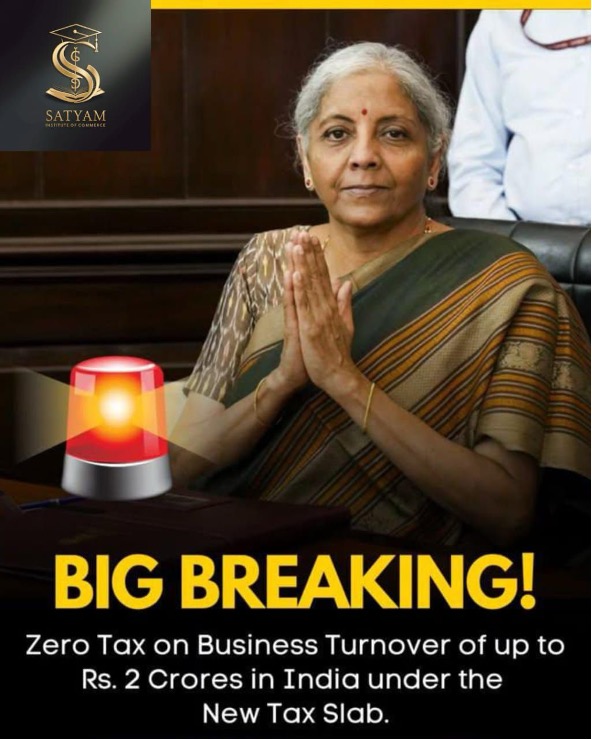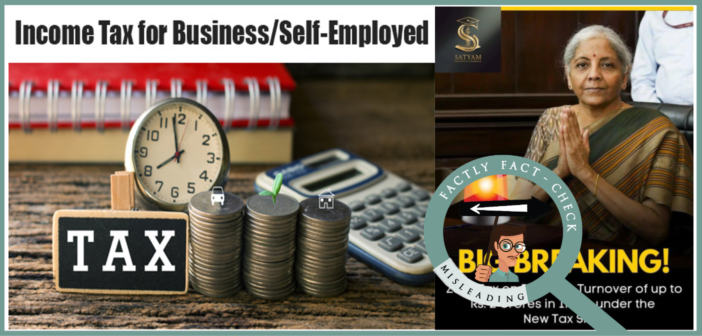A widely shared social media post (here, here & here) claims that businesses with a turnover of up to ₹2 crore are completely exempt from paying tax under India’s new tax slabs. Let’s fact-check this claim to determine its accuracy.

Claim: Businesses in India with a turnover of up to ₹2 crore are completely exempt from taxes.
Fact: Under Section 44AD of Income Tax Act, 1961 , eligible businesses meeting certain criteria can declare 6-8% of turnover as profit, and if this remains within ₹12 lakh, no income tax is payable. However, this is applicable only for individuals, meaning only Proprietorship businesses. Other businesses like partnership firms, one person companies and other companies will have to pay taxes even if the profit remains within ₹12 lakh. Further, those with higher cash transactions or actual profits exceeding this limit are still taxed. Presumptive taxation is optional, and businesses opting out must pay tax on actual profits. Other taxes like GST and professional tax may still apply, making universal exemption incorrect. Hence the claim made in the post is MISLEADING.
Taxation of Businesses in India:
Businesses in India are subject to direct taxes (such as income tax and corporate tax) and indirect taxes (such as GST and professional tax), depending on their type, size, location, and nature of operations.
In the 2025-26 budget, the Finance Ministry raised the tax-free income threshold from ₹7 lakh to ₹12 lakh for individuals. With a standard deduction of ₹75,000, salaried individuals earning up to ₹12.75 lakh owe no income tax under the new regime. Now, let’s see if this exemption applies to businesses with a turnover of up to ₹2 crore.
Understanding Presumptive Taxation Under Section 44AD:
Section 44AD of the Income Tax Act, 1961 allows small businesses to opt for a presumptive taxation scheme, simplifying tax compliance by estimating profits instead of maintaining detailed books of accounts. Under this scheme, businesses with a turnover of up to ₹2 crore (or ₹3 crore for digital transactions) are required to declare a presumed profit of:
- 8% of turnover for cash transactions
- 6% of turnover for digital transactions
A similar scheme under Section 44ADA applies to professionals like doctors, lawyers, and architects, but with different conditions.
Who Can and Cannot opt for Presumptive Taxation?
Eligible for Presumptive Taxation under Section 44AD:
- Resident individuals, HUFs, and partnership firms (except LLPs)
- Businesses with turnover up to ₹2 crore (₹3 crore if cash transactions are 5% or less)
- Businesses not engaged in agency services, commission-based earnings, or other excluded activities
Not Eligible for Presumptive Taxation:
- Non-residents and LLPs
- Businesses exceeding the turnover limit
- Businesses engaged in hiring, leasing, commission-based services, or covered under Section 44AE
More details about the Presumptive taxation scheme can be seen here
Impact of New Tax Slabs on Section 44AD:
With the new tax slabs introduced in Budget 2025-26, the impact of Section 44AD depends on the business registration type, business turnover and mode of transactions. Under presumptive taxation, businesses must declare 6% of turnover as profit for digital transactions and 8% for cash transactions. If the presumed profit remains within ₹12 lakh, no tax is payable under the new regime. However, this is applicable only for individuals, meaning only proprietorship businesses. Other businesses like partnership firms, one-person companies and other companies will have to pay taxes even if the profit remains within ₹12 lakh. Further, those with higher cash transactions or actual profits exceeding this limit are still taxed.
For instance, a proprietorship business with a ₹2 crore turnover and 95% digital transactions would have a presumed profit of ₹12 lakh, which falls within the tax-free threshold, resulting in zero tax liability (provided there are no additional taxable incomes or other factors affecting tax computation). However, if the same proprietorship business conducts more cash transactions, the presumed income increases to ₹16 lakh, making it taxable under the new regime. Thus, proprietorship businesses with a turnover below ₹1.5 crore generally benefit from the new exemption, while those with higher cash-based earnings may still have tax obligations. Additionally, presumptive taxation is optional, and businesses opting out must pay tax on actual profits. Moreover, other taxes such as GST, professional tax, and other regulatory levies are still applicable. An important point to note is that this provision is applicable only to individuals, meaning only proprietorship businesses. Other businesses like partnership firms, one-person companies and other companies will have to pay taxes even if the profit remains within ₹12 lakh.
To sum up, the claim that businesses with a turnover of up to ₹2 crore are completely exempt from tax is misleading. Under Section 44AD of the Presumptive Taxation Scheme, only proprietorship businesses with predominantly digital transactions may fall within the tax-free limit, those with higher cash transactions or other types of businesses will not benefit from this.



